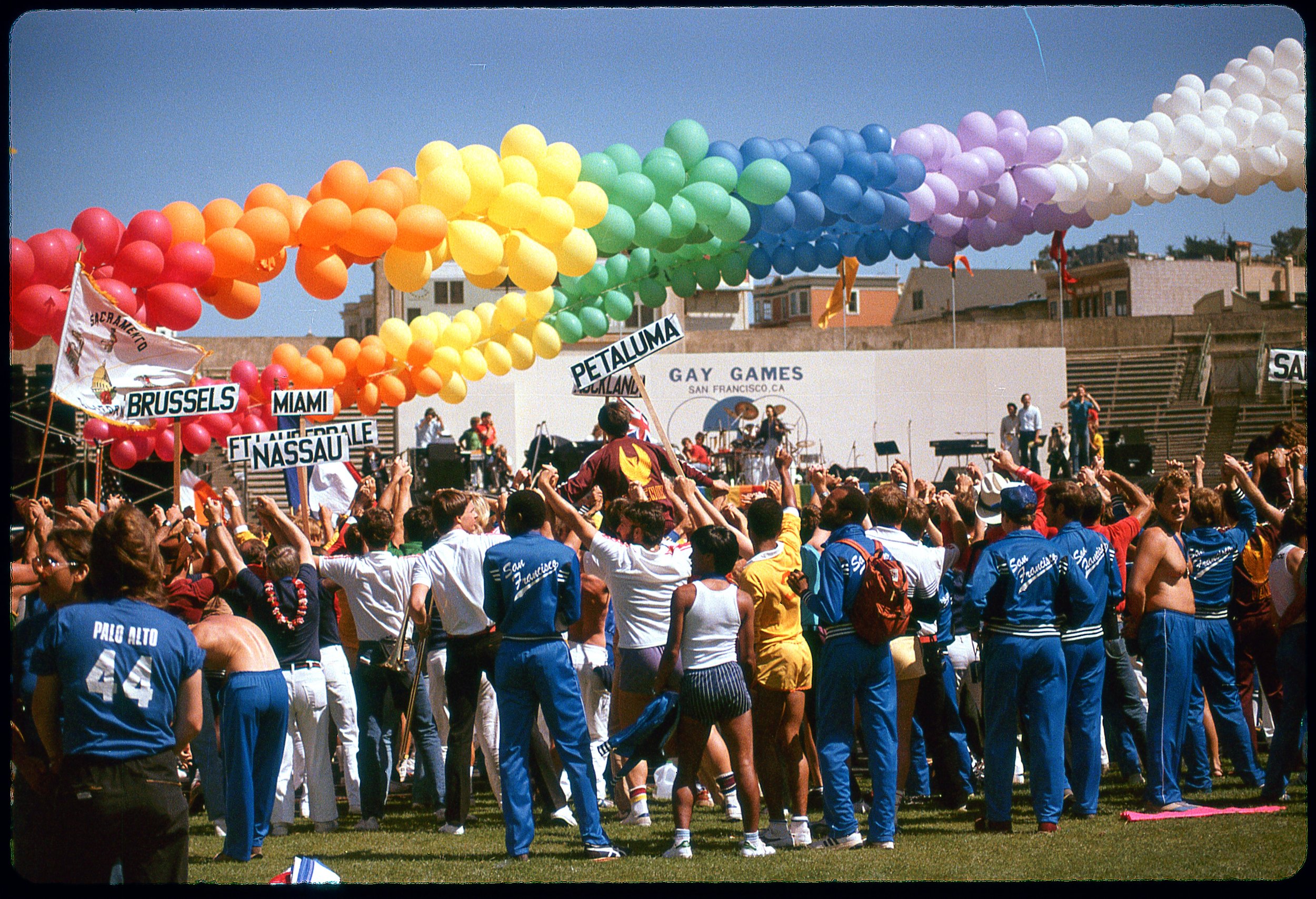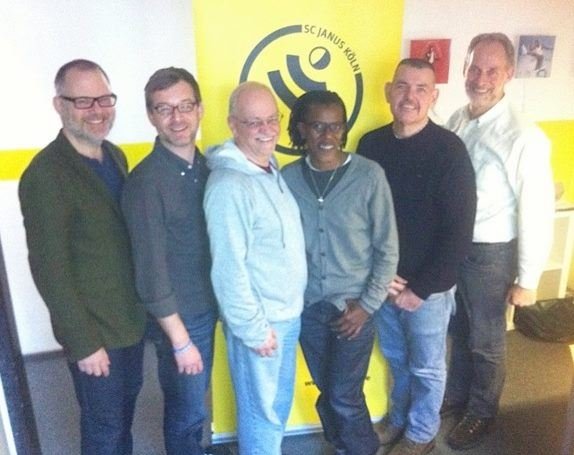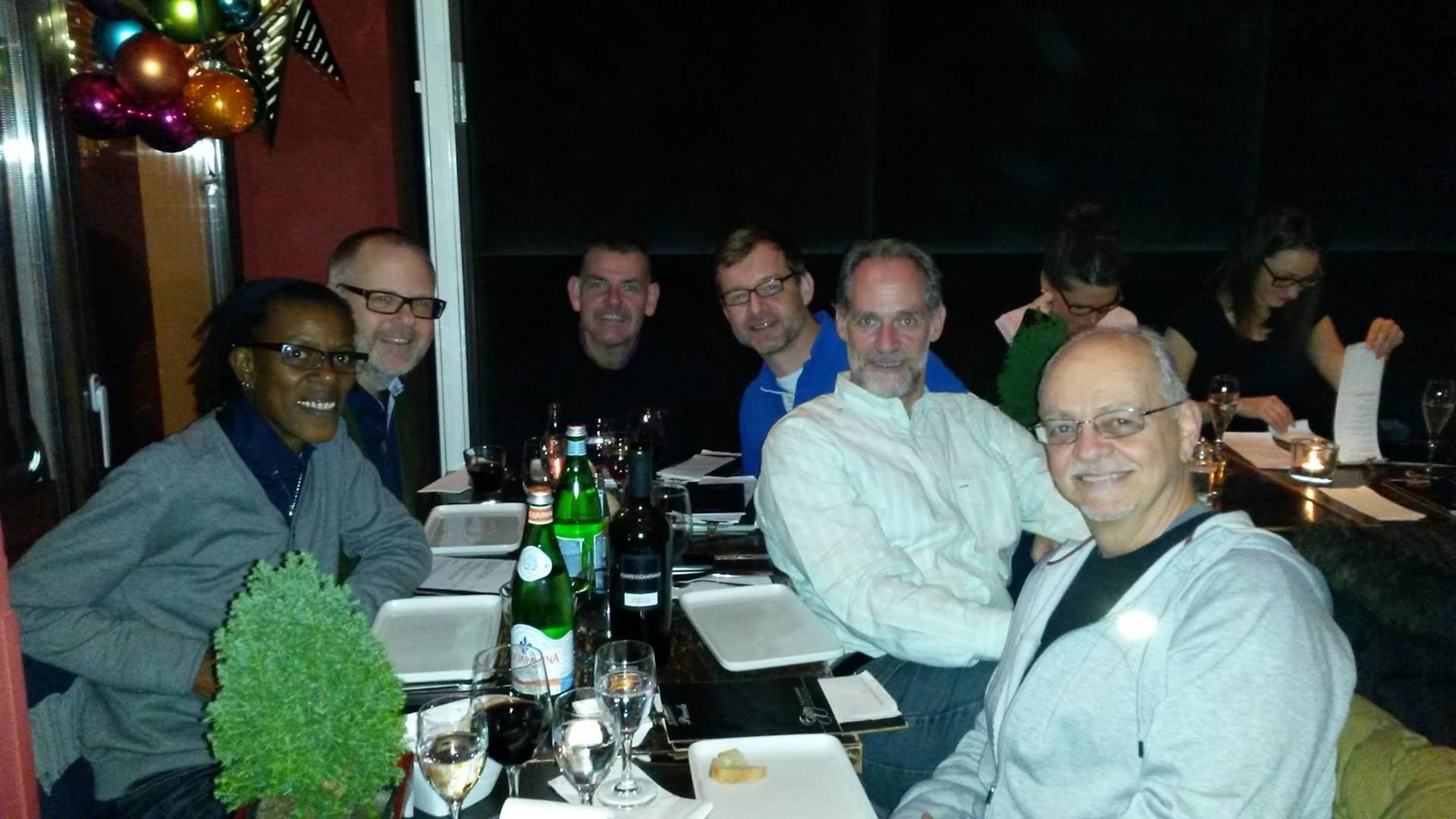
Passing the Torch
23.
The End of 1WE: Focus Forward
SHAMEY CRAMER: Three months after the Montreal Summit between the FGG and GLISA, the FGG held its Annual General Assembly in Sofia Bulgaria, hosted by Tangra SC; the first time a queer sports-related event occurred east of the Balkans. The Assembly members were very irate that we hadn’t reached a successful conclusion. I remember pointing out to them that the only deal GLISA was willing to consider required the Host Organization to pay nearly US$500,000 License Fee, which was exorbitant and unrealistic. The Assembly representatives insisted we re-engage, so I was once again put on the team, with newly-elected Board member Armin Lohrmann also assigned to the task.
Koln working group: Martin, Christensen, Armin Lohrmann, Greg Larocque, Joanie Evans, Barry Taylor, Shamey Cramer
In October 2013, The FGG and GLISA began communications once again to see about repairing the damage that had been caused ten years earlier by Montreal’s decision to launch the OutGames. During that time, OutGames I in Montreal, OutGames II in Copenhagen and OutGames III in Antwerp all suffered multi-million dollar losses.
When Joanie Evans joined the Board in early 2014, she replaced Kurt Dahl as the FGG Team Leader for what would become known as One World Event/1WE. Armin, Joanie, and I developed a strong bond and good working relationship. We also worked well with GLISA representatives Gregg Larocque from Canada and Martin Christensen from Denmark. Soon after, Barry Taylor from Australia joined their team.
L-R: Joanie Evans, Martin Christensen, Barry Taylor, Armin Lohrmann, Shamey Cramer and Greg Larocquen
FGG representatives, including Emy Ritt, had met at the annual meeting for the European Gay and Lesbian Sport Federation in Lubljana where they outlined and agreed to a revised plan for negotiations.
It was also around this time I reached out to attorney David Huebner, the former U.S. Ambassador to Aotearoa/New Zealand, who agreed to represent the FGG in our ongoing negotiations. He would later serve as an observer to the legal proceedings involving the detainees held in Guantanamo Bay by the U. S. Government for their involvement with the attacks that occurred on 11 September, 2001.
In December 2014, SC Janus, the queer sports organization in Cologne Germany, hosted the 1WE Working Group. Although the discussions between the six representatives were mostly smooth, there were several sticking points, including GLISA once again refusing to have a third-party audit of our two organizations.
During the next thirty days, the Working Group drafted the Cologne Report, which outlined several ways we could move forward. Due to health matters, Barry Taylor stepped down from the group, and was replaced by Victor Elkins, the new GLISA Co-President. Gregg Larocque and I represented the Working Group at a Town Hall in San Francisco in April 2015.
In May, a Memo of Understanding was drafted and approved between the two groups, which caused quite a bit of animosity from the FGG “Old Guard” based in San Francisco, directing their anger toward the 1WE Working Group, especially the three FGG members. We were subjected to unnecessary vitriol on social media and in the Bay Area Reporter’s Jock Talk opinion column. This, in turn, caused increased obstinance from GLISA during the negotiations, further delaying resolution and putting the FGG team between a rock and a hard place.
Stockholm meeting, L-R: Armin Lohrmann, Shamey Cramer, Martin Christensen, Joanie Evans, Victor Elkins
Since GLISA still refused to an external audit, the FGG Board voted unanimously to support a Risk Analysis summary as the Working Group hosted another forum during the Stockholm 2015 EuroGames. Also in attendance was Ivan Cano, the main organizer for the Miami 2017 OutGames.
On September 26, in a show of solidarity, a Site Selection meeting was scheduled. Unfortunately, GLISA representatives did not attend. A week later during the monthly 1WE Working Group call, I once again pressed to have an outside audit, with GLISA representative Gregg Larocque claiming it was “not worth the expense.”
During its 2015 Annual General Assembly in Limerick Ireland, the FGG voted to support the Memo of Understanding, but chose not to accept the first two of the four options presented in the Cologne Report. Thus, the FGG Board continued focusing on the other two options as it moved forward with its Risk Analysis.
It was also determined that the next step would be for each organization to have seven representatives on a Transition Commission. The FGG team was pleased to have former FGG Co-Presidents Kathleen Webster and Rick Peterson join the FGG Board members who had been part of this operation the past three years.
In order to activate the Risk Analysis, the FGG created a list of 48 questions - 31 which were submitted to GLISA for a response. Unfortunately, GLISA continued to stall, refusing to respond to the questions.
Despite continued letters back and forth between the two sets of Co-Presidents, GLISA continued to refuse to respond to the FGG requests, or appoint members to the Transition Commission. On 29 January 2016, The FGG submitted its third request for a response to our 31 questions, with a 5 February response deadline, letting GLISA know that not responding to the questions made it too high risk a venture to create a combined quadrennial event.
When GLISA chose not to respond, the FGG Board voted at its February meeting to cease all discussions and activities with GLISA. A letter was sent to the GLISA Co-Presidents on 2 March informing them of our decision, and published a Letter to the Global LGBTIQ+ Sports Community citing our reasons for doing so.
It had been more than a dozen years since Montreal had walked away from hosting Gay Games VII, and seven since the FGG did everything it could to create a unified event. The following year, on what was supposed to be the Opening Day for OutGames IV: Miami 2017, with thousands of athletes and artists already assembled, Ivan Cano and the other organizers issued a statement informing the participants that they had not secured the venues and were cancelling the OutGames.
Needless to say, since most of the athletes and artists were already in Miami or literally in flight, there was a lot of anger. Following an investigation by the state of Florida’s Attorney General, it was deemed that although the Miami organizers had mismanaged their event, they could not be held liable for the financial burden by those who had trained, registered, and attended the anticipated event.
Although the organizers shirked their responsibilities, many of the local sports organizations, as well as those with previous experience producing their sport competitions, worked fervently to present opportunities for the athletes and artists to engage. It was nice to see that even in the most difficult of circumstances, the athletes and artists rose to the occasion.
GLISA soon folded, and the following year, Gay Games 10: Paris 2018 proved to be the most financially successful Gay Games to date.
Ad for the ill-fated 2017 Miami OutGames Opening Ceremony, cancelled one day before it was scheduled to take place
TONY SMITH: Along with promoting Gay Games 10 Paris and the bid process for Gay Games 11, the road to Paris also entailed the arduous communications necessary during the negotiations with the World OutGames organization. OutGames ended up closing operations in that timeframe due to corporate mismanagement. With regards to communications efforts, I was adamant that the FGG would always take the higher ground and empathy for all during those tough times. The FGG’s success has continued due to its commitment to athletes, supporters, and the mission of the organization.
The rainy 2014 International Rainbow Memorial Run, held just outside historic Kezar Stadium, the site of GGI and GGII. Reggie Snowden holds the green flag. The center photo shows Gene Dermody holding the microphone for Brent Nicholson Earle, who is wearing Tom Waddell's 1968 Olympic warm-up jacket.
REGGIE SNOWDEN: Living in San Francisco, we are lucky to have so many historic events right here in our backyard. From the inception of the Gay Olympics that became Gay Games to the creation of the AIDS Memorial Quilt, I don’t need to walk far to find inspiration.
In 2014, I attended the International Rainbow Memorial Run with a small handful of members from the San Francisco Track & Field Club and San Francisco FrontRunners. It was another foggy, rainy morning in San Francisco and the incomparable warrior Brent Nicholson Earle shared his words of wisdom and emotional story about running across the United States for Breast Cancer awareness and for those he had lost to AIDS. Each section we stopped along the run, Brent would share more stories and it ended at the United Nations Plaza at Civic Center, downtown San Francisco when they did the quilt ceremony and read names we can never forget. We had about 15 people towards the end of the event. I promised Brent I would organize the next International Rainbow Memorial Run that would take place in 2018, prior to Gay Games, Paris.
To follow up with my promise to Brent, I started to reach out to various clubs. Being an active member of San Francisco FrontRunners, it was easy to get the runners involved along with San Francisco Track & Field. Cheer San Francisco lead us with a roar as wrestlers, basketball players, volleyball players, soccer players, tennis players and other organizations were in attendance.
The President of SF FrontRunners welcomed us as we had one of the largest circles to welcome guests and supporters. Honorary Lifetime Members of the Federation of Gay Games Brent Nicholson Earle and Gino Carmody, both recipients of the prestigious Tom Waddell Award, addressed the participants as we proceeded from Stow Lake to the AIDS Memorial Grove where more stories were shared. From there, we ran to where it all began in 1982: Kezar Stadium. We did a roll call of each city Gay Games were hosted by and recognized a couple members who have attended all Gay Games since 1982. From there we completed the run and we’re welcomed by CHEER San Francisco and sister clubs as we completed the run.
We were honored to have Gino Carmody sing and speakers included Sara Lewinstein Waddell and State Senator Scott Wiener. As the names were announced and the quilt ceremony took place, CHEER San Francisco created an impromptu magical moment as they embraced hands to form a large circle of around 80 participants. As so many names were announced, there were tears of sorrow as we reflected on how far we have come but also as a reminder that our fight isn’t over yet for participation, inclusion and personal best around the world.






